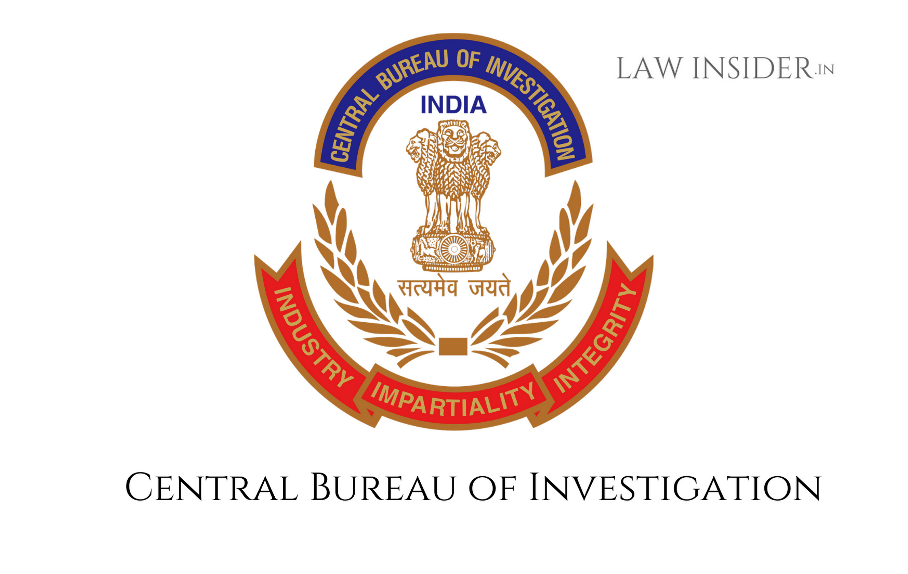Vertika Johri
The ongoing scenario of our country with criminals breeding and eating the society from every nook and cranny has led to believe we need speedy actions against such breeders.
It has been evidently proved that Judiciary of our country has been failing to resolve cases and take actions against such crimes and the criminals since the power was vested years ago.
The Legislation of our country is also to be blamed for not coping up with the crimes that are increasing with every minute, there are no strict provisions regarding heinous crimes which make these criminals more fearless.
Central bureau of Investigation in recent times have proved to be the most effective authority when it comes to solving the cases. With the corruption level of our country, it is not possible for a local authority to work unbiased.
The central authority is what we can believe to be unbiased, as currently we have to rely on something to make this society a better place. The CBI came into being during the World War II, when the colonial government felt the need to probe cases of corruption in the War and Supply Department. A law came in 1941. It became the DSPE Act in 1946.
The Act to set up CBI was not passed by Parliament. It was created by an executive order of the government. In that sense, the CBI is not a statutory body.
The CBI functions under the Ministry of Personnel, Public Grievances and Pensions of the central government, and is exempted from the purview of the Right to Information (RTI) Act.

The CBI investigates three types of cases through three specialised wings. The Anti-Corruption Division that probes cases of corruption against public servants. The Economic Offences Division probes crimes of financial malfeasance, bank frauds, money laundering, black money operations, and the like.
However, the CBI usually transfers cases of money laundering to the Enforcement Directorate (ED). There is a Special Crimes Division to investigate cases of violence such as murder, crimes related to internal security such as espionage, narcotics and banned substances, and cheating.
Recently Supreme Court has said regarding the consent clause that CBI Investigation will not be deemed vitiated just because of Lack of State Govt Consent
It is this division of the CBI that generally handles cases that get wide media coverage, for example, actor Sushant Singh Rajput’s death case. Everything follows a certain procedure which the law of the country allows, CBI works on a General Consent which every state has consented to take up certain matters the authority deems acceptable or serious or can be manipulated.
WHAT IS GENERAL CONSENT OF CBI.
General consent is normally given to help the CBI seamlessly conduct its investigation into cases of corruption against central government employees in the concerned state.
It had been a duty of every state of the country to willingly consent the authority to act Suo moto, otherwise every time CBI has to obtain the consent from every state and it would have been impossible to further proceed such cases given to the lengthy procedure of our Legislation.
Unlike the National Investigation Agency (NIA), which is governed by its own NIA Act and has jurisdiction across the country, the CBI is governed by the Delhi Special Police Establishment Act.
This makes consent of a state government mandatory for conducting an investigation in that state. There are two kinds of consent: case-specific and general. Given that the CBI has jurisdiction only over central government departments and employees, it can investigate a case involving state government employees or a violent crime in a given state only after that state government gives its consent.
Section 6 of the DPSE Act authorises the central government to direct CBI to probe a case within the jurisdiction of any state on the recommendation of the concerned state government. The courts can also order a CBI probe, and even monitor the progress of investigation.
The CBI manual says, “The central government can authorize CBI to investigate such a crime in a state but only with the consent of the concerned state government. The Supreme Court and High Courts, however, can order CBI to investigate such a crime anywhere in the country without the consent of the state.”
Recently the non-BJP ruled states are withdrawing the General consent given to the CBI which make the authority a caged parrot speaking in its master’s voice, as now CBI has to seek permission from every state to act upon a case.
The reason behind the withdrawal of such power invested in the CBI is as claimed to restrain the power of the central government in non-ruling party states. This is further criticized as well because since the authority now has no power to act Suo Moto there is no further check on the malicious activities.
TYPES OF CONSENTS
GENERAL CONSENT- When a state gives a general consent to the CBI for probing a case, the agency is not required to seek fresh permission every time it enters that state in connection with investigation or for every case. When a general consent is withdrawn, CBI needs to seek case-wise consent for investigation from the concerned state government.
SPECIFIC CONSENT – If specific consent is not granted, the CBI officials will not have the power of police personnel when they enter that state.
This hurdle impedes seamless investigation by the CBI. A general consent is given to facilitate that seamless investigation in a case of corruption or violence.
LEGAL REMEDIES FOR CBI
The withdrawal of the General Consent doesn’t mean there cannot be any way for the authority to act, there are still some cases where the central government can order the CBI to act without general consent of the states upon a certain case.
The legal remedies provided by the criticised Legislation. The CBI can always get a search warrant from a local court in the state and conduct searches.
In case the search requires a surprise element, there is CrPC Section 166, which allows a police officer of one jurisdiction to ask an officer of another to carry out searches on his behalf. And if the first officer feels that the searches by the latter may lead to loss of evidence, the section allows the first officer to conduct searches himself after giving notice to the latter.
WHICH STATES HAVE WITHDRAWN GENERAL CONSENT?
There are at least seven states at present which have withdrawn general consent to the CBI requiring the agency to seek case-specific permission.
They are Mizoram, West Bengal, Rajasthan, Maharashtra, Chhattisgarh, Kerala, Punjab and Jharkhand. All of these states are ruled by the opposition parties except Mizoram, where the ruling Mizo National Front (MNF) is part of the NDA but invariably takes a stance opposite of the BJP. Of the rest, Rajasthan, Chhattisgarh, Maharashtra and Jharkhand have the Congress as part of the governments. Congress has its own majority governments in Rajasthan and Chhattisgarh.
In July 2019, a central government release said the CBI does not have a general consent from Tirpura for investigation. However, in a multi-state raid, the CBI later conducted searches in Tripura, which is ruled by the BJP.
Punjab, a Congress-ruled state the recent state to join the race of withdrawing general consent of CBI. In a significant move, had withdrawn specific consent for a bunch of cases being probed by the CBI related to sacrilege. The cases had been handed over to the CBI in 2015 by the Shiromani Akali Dal-BJP government.
After coming to power, the Captain Amarinder Singh government took back all the. It has to be noted that not all the opposition states have withdrawn the consent there are a few states still either on the way to withdraw or have accepted that the withdrawal of such consent is actually a boon on the country.
Andhra Pradesh, Telangana and Odisha are ruled by non-BJP parties, the YSR Congress Party, the Telangana Rashtra Samiti and AIMIM, and the Biju Janata Dal, respectively. But these parties are not part of the Congress-led alliance either.
Andhra Pradesh had previously withdrawn general consent to the CBI when the state was ruled by the Telugu Desam Party (TDP) and N Chandrababu Naidu was the chief minister. Naidu, after quitting NDA, had withdrawn the general consent, which was restored by the YS Jagan Mohan Reddy government, when it came to power in 2019.
Delhi too is ruled by the BJP’s rival the Aam Aadmi Party (AAP) led by Chief Minister Arvind Kejriwal. But the Delhi government cannot withdraw its consent to the CBI. The same is the case with Puducherry that is ruled by the Congress. Like Delhi, Puducherry is also a Union Territory.
AFTERMATH
The CBI continues to probe in old cases until specifically taken back by the state government. Further, it continues to investigate cases that were given to it by a court order.
The CBI can challenge the decision in a court showcasing its progress of investigation in the case. In Punjab’s case mentioned earlier, the Punjab and Haryana High Court had refused to reverse the state government’s decision.
Further when the CBI does not have a general consent, it can approach a local court for a search warrant and conduct investigation. There is a provision in the CrPC that allows search and investigation in a state by outside agency but it has to happen through a local court.
The decision taken by the states should worry the central government because this will limit the power of central government in non-ruling states, moreover it is expected the crime ratios to increase in the country, the states have not given some solid reason in doing so which point the needle towards rivalry with the central government.
Though still the judicial system is above the state legislations but the country now knows the truth.
[1]REFERENCES
- https://www.oneindia.com/
- https://www.insightsonindia.com/
- https://www.indiatoday.in/india/story/
- https://www.thehindu.com/news/national/

